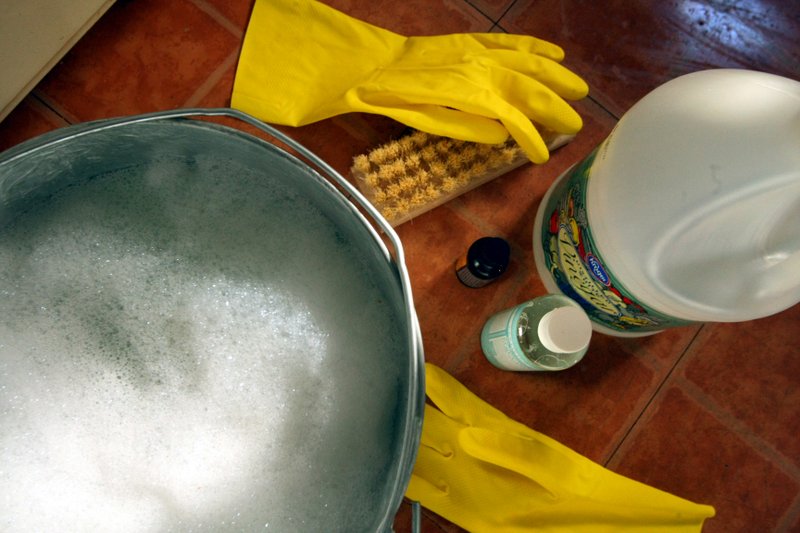Another year, another article telling you how to spring-clean your home. Not so! In fact, we're here to tell you what not to do when giving your house the deep clean it so deserves this time of year.
Here are cleaning mistakes you'll want to avoid this spring.
• Starting without a plan of attack
Debbie Sardone, co-owner of SpeedCleaning.com, says many homeowners make the mistake of beginning to clean their house without first devising a plan to get everything done. Instead of just diving in, Sardone suggests you start cleaning upstairs and make your way down, or start on one side of the house if your home is a single story. Then, "move room to room, tackling one room at a time," she says.
• Cleaning a room from floor to ceiling
Some people begin cleaning a room by vacuuming or mopping floors, which is the wrong approach. Think about it: If you clean the floor, only to then knock dust and dirt to the ground from ceiling fans, blinds and furniture, you'll have to clean the floor again. A better strategy is to start at the top and work your way down. In other words, begin by removing cobwebs and dust on the ceiling, then "clean off clutter, dust furniture, wipe down walls, switches and doors" before cleaning the floor, says Beth McGee, author of Get Your House Clean Now: The Home Cleaning Method Anyone Can Master.
• Using weak cleaning products for tough grime
When asked to pick the attributes they seek when purchasing all-purpose cleaners, 40 percent of people recently surveyed by Nielsen said they want to use environmentally friendly cleaning products, and 36 percent said they don't want to use cleaning products with harsh chemicals. Even though that's admirable, McGee says, all-natural cleaners aren't always the best choice. "Don't bring a knife to a sword fight," she says. "If you have not kept up with cleaning and have difficult grime to remove, stronger cleaners may be in order to get your items into a condition that is easy to maintain with less powerful products."
Sardone agrees. "Some chores require sanitizing cleaners, like a bleach-based product, but most do not," she says.
To routinely clean your home? McGee says using a spray bottle with a simple mixture of 1 cup water, 1/2 cup white vinegar and 1/4 cup grease-cutting dish soap will clean most surfaces well.
• Using only one rag to clean your house
Rags get dirty the more you clean with them — that's no surprise. Still, some people use one rag to clean their entire house, which can cause germs to spread, Sardone says. Instead, keep "a stack of 100 percent cotton cloths or microfiber cloths to change out when they are dirty," Sardone recommends. "These can be washed and reused" the next time you clean.
• Drying surfaces with paper towels
Cotton or microfiber cloths are also more efficient for drying surfaces than paper towels -- and they won't leave lint behind. Another reason to stop using paper towels: Many have a rough surface that can scratch or damage delicate furniture and TV screens.
• Not opening windows to let your house air out
Ventilation is crucial whenever you're using cleaning products, Sardone says. The simple act of opening windows can counteract the indoor air pollution from cleaning products and make it easier for you to breathe.
Cranking up your air conditioning won't solve the problem, because most home heating and cooling systems don't mechanically bring fresh air into the house from outdoors.
• Mixing chemicals from different products
Combining chemicals from different cleaning products can create harmful fumes, Sardone warns. "Most of us have no idea what's in the cleaners we're using and how those ingredients react to each other," she says. "Bleach and vinegar, for example, are a deadly combo." Together, they produce chlorine gas -- and exposure to chlorine gas, even at low levels, can cause coughing and breathing problems, as well as burning and watery eyes. "Higher levels of exposure can cause chest pain, more severe breathing difficulties, nausea, pneumonia and fluid in the lungs," according to the Utah Department of Health. "Very high levels can cause death."
• Washing the windows on a sunny day
Though sunlight can help illuminate how dirty your windows are, you're better off washing them on a dry, cloudy day. Why? Because strong heat from the sun will dry cleaning fluid more quickly, which could leave hard-to-remove streaks or stains.
• Vacuuming pet fur without an attachment
Having trouble cleaning up pet fur? You may be using your vacuum the wrong way. By vacuuming without an attachment, odds are you're just blowing fur around a room -- not effectively removing it. That's why home-maintenance expert Bob Vila recommends using a rubber-bristle brush that, "when attached to your vacuum tube, sucks hair directly from the brush to the vacuum canister." Just make sure to buy one that fits your vacuum's wand.
• Waiting until vacuum bags are full to replace them
Many newer vacuum cleaners have an indicator that will let you know when the bag needs to be changed, but a lot of older vacuum cleaners don't -- and allowing a vacuum bag to become too full can affect its performance, McGee says. "If you notice your vacuum is not picking items up as effectively as you would like, then change the bag, if there are no other clogs impeding its efficiency," McGee says.
HomeStyle on 04/06/2019
